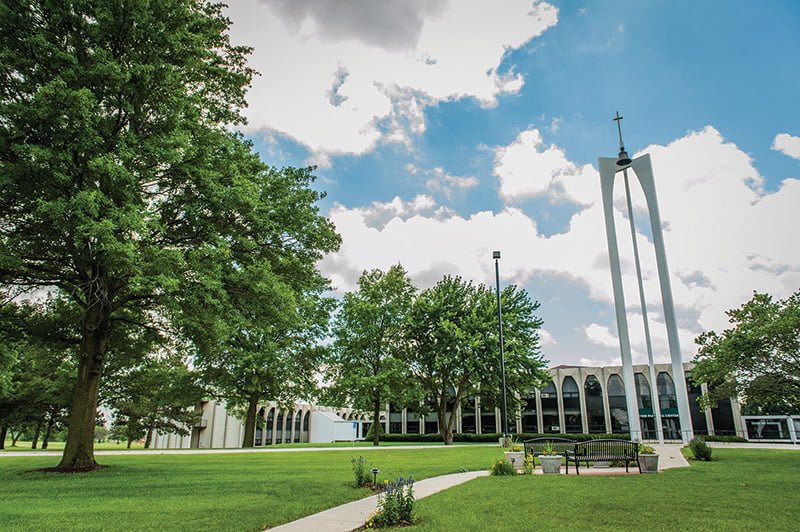
by Joe Bollig
joe.bollig@theleaven.org
KANSAS CITY, Kan. — Despite the disruptions and delays that COVID has caused across the country, here in the Archdiocese of Kansas City in Kansas, leaders are moving forward with planning for the future.
“The mutually shared vision is an attempt to frame our purpose, vision, pastoral priorities and key initiatives so we can focus our efforts to get the very best results,” said Steve Ehart, outgoing consultant for the archdiocesan office of mission strategy.
The archdiocesan pastoral plan, called the mutually shared vision, was formulated by Archbishop Joseph F. Naumann and his Envisioning Team and was announced and implemented in August 2015.
The vision features three key initiatives, but the articulated goals have been periodically revised.
“The newest version [this year] is the fourth revision,” said Ehart. These goals will be developed now through 2022.
In the past, revisions were called for as various goals were achieved. But this time, while some goals have been reached, others have been delayed due to the pandemic.
The first key initiative is to “build a culture of evangelization across the archdiocese.” The revised goals are:
•With guidance from the archdiocesan office of evangelization, parishes will accelerate the cultural shift to individual missionary discipleship by fostering eucharistic amazement, scriptural engagement, personal prayer and intentional accompaniment through October 2022. Parishes will submit annual reports documenting evangelical activity and progress on the “Enflame Plan.”
• Using resources from the Enflame initiative, parishes and schools will grow and equip missionary disciples by offering experiences that prepare and empower individuals to enflame hearts, homes and communities through October 2022.
• Foster the living of a simple way of life by expanding the School of Faith’s Movement of the Holy Family to 11,000 subscribers and 1,000 members.
“The Movement of the Holy Family is a movement of families and friends who live a simple way of life of friendship, good conversation and the rosary,” said Mike Scherschligt, CEO and president of the lay apostolate Holy Family School of Faith. “We are a movement of friendship because people come to God through other people.”
The second key initiative is to “strengthen the vocation of marriage and family life.” The revised goals are:
• By Advent 2021, the office of marriage and family life will help parishes to enflame homes across the archdiocese by providing practical tools for enriching marriages, strengthening Catholic identity and fostering family prayer life.
• The office of children’s catechesis will help parishes better equip parents to be the primary teachers of the faith by completing and distributing approved materials, including the “Parents as First Teachers of the Faith” video series, and supplying the appropriate directions for their use by June 1, 2021.
Even before the pandemic hit, the archdiocesan office of marriage and family life was providing activities in the home with the “Enflame Our Homes Initiative” through “The Joyful Homes Project.”
“For Joyful Homes, we were leaning toward this even before the pandemic hit, instead of having another event,” said Libby DuPont, consultant for the archdiocesan marriage and family life office. “The pandemic has changed the focus of the format. We wanted families to do more together and less outside of the home.”
“One of the things we wanted to achieve was to equip families in their homes with digital resources to accomplish these goals,” said Brad DuPont, consultant with the archdiocesan marriage and family life office. “The pandemic made it the only option anyway.”
The third key initiative is to “cultivate relationships by engaging in the corporal and spiritual works of mercy.” The revised goals include:
• In order to grow as companions in faith, by Pentecost 2021, all parishes in the archdiocese will have entered into an intentional partnership with at least one other parish to engage in projects of mercy and support in order to better encounter Christ in one another. For parishes that are currently twinned, a climate of collaboration will be fostered through coaching and sharing of best practices.
• By June 1, 2021, each parish, alone or in collaboration with other parishes, will commence outreach that is inclusive and supportive of parishioners with disabilities beginning with participation in faith formation programs (including sacramental preparation) and participation in the liturgy.
“One of my big thrusts within that goal is to secure a person in each parish, especially the 32 largest parishes in our archdiocese, to be a parish advocate and contact person [for] a person with a disability or a family of a person with a disability,” said Tom Racunas, lead consultant with the archdiocesan office of special-needs ministry.
The goals under the third key initiative were not revised because the goals were not reached due to the pandemic.
“COVID-19 just put brakes on all that because there wasn’t any activity in the parishes,” said Racunas.






